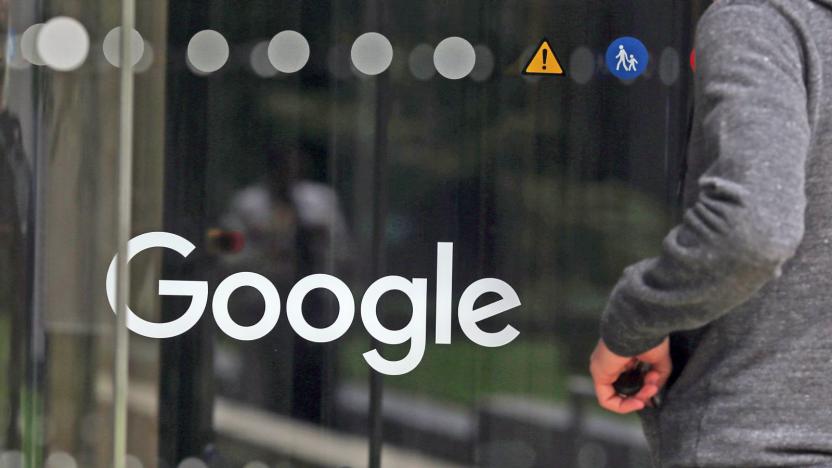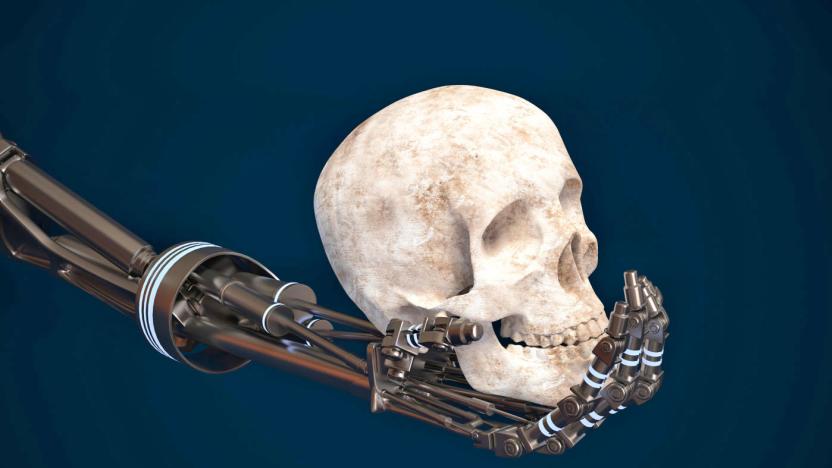algorithms
Latest

Algorithms transform Chicago scenes into trippy lobby art
Office lobbies are prime spots for corporations to make statements about their values and taste, yet "lobby art" is usually a shorthand way of saying "insipid crap." However, a studio called ESI Design has given a Chicago office building a much more interesting, experimental and local take on it. Called "Canvas," it's a 14- by 23-foot LED display installation that generates moving paintings based on video from the Chicago River and Navy Pier amusement park rides. "The daily motion of Chicago 'paints' the pictures into place at 515 North State," said ESI's Senior Designer Ed Purver.

After Las Vegas shooting, Facebook and Google get the news wrong again
The worst mass shooting in modern US history took place last night in Las Vegas, where a gunman killed at least 58 people and injured more than 515 others, according to the latest reports. Not long after the unfortunate event, Facebook and Google began populating news stories on their respective platforms, as they often do. And, in what's become a problematic trend, some of the articles being highlighted and distributed to millions of people were from unreliable sources. This time, among them were a trolling thread on internet forum board 4chan and a completely false story from a far-right conspiracy website.

The panic and pleasure of online dating as a woman in her 40s
Dating in my twenties and thirties made me feel like Odysseus, trying to choose between dashing myself on the ego-bruising rocks of casual romps or a slow death from unrequited lust for garbage humans. There was the ex who brutally dumped me but wouldn't stop emailing me for months, whose presence at dorky work gatherings made me dizzy; the sociopathic film critic whose shoulder I virtually cried on; the go-nowhere first dates; and the great, wide swaths of time spent single, usually pining after some unavailable director or writer who'd relish my attention and nothing else. And lots of therapy.

Google's AI gets human help to avoid offensive search results
Google is making a new push to eliminate offensive search results such as those that appeared from US neo-Nazi site Stormfront in response to queries about the Holocaust. As Search Engine Land noticed, the site has revised its guide on how to assess search result quality for around 10,000 of its "quality rater" contractors. That includes a new "upsetting-offensive" content flag for the promotion of violence or hate against minorities and other groups, racial content, graphic violence and human trafficking.

AI continued its world domination at Mobile World Congress
Silicon Valley investor and web pioneer Marc Andreessen said in 2011 that "software is eating the world." The explosion of app ecosystems seems to prove his point, but things have changed dramatically even since then. These days, it might be more accurate to say that "AI is fueling the software that's eating the world," but I've never been very quotable. In any case, it's impossible to ignore the normalization of artificial intelligence at this year's Mobile World Congress -- even if a resurrected 17-year-old phone did end up stealing the show.

Facebook will try fighting ad discrimination with algorithms
Facebook is making changes to its advertising policy following last fall's revelation that ad purchasers could discriminate by race. The social network's solution at the time was to use algorithms that would weed out posts that used "ethnic affinity" for ads offering housing, employment or credit. Now, the anti-discrimination methods are going further.

Google is working on a kill switch to prevent an AI uprising
Humans don't like the idea of not being at the top of the food chain; having something we've created taking power over us isn't exactly ideal. It's why folks like Tesla mastermind Elon Musk and noted astrophysicist Stephen Hawking are so determined to warn us of the terrifying implications that could culminate in a Skynet situation where the robots and algorithms stop listening to us. Google is keen to keep this sort of thing from happening, as well, and has published a paper (PDF) detailing the work its Deep Mind team is doing to ensure there's a kill switch in place to prevent a robocalypse situation.

Snapchat's content feed could go algorithmic
Snapchat's main content feed could soon get an algorithmic shakeup, Digiday reports. According to sources, Snapchat has been working on updates to its platform that would affect professional or brand accounts and re-arrange the chronological flow of content you see from the accounts you follow.

How Netflix's global growth is making recommendations better
Netflix recommendations might appear simple on the surface, but there's a specific science behind the lists of movies and TV shows it thinks you should watch next. Star ratings, Facebook integration and catalog size have traditionally played a part, but with the streaming company now operating in 130 countries worldwide, things needed to change.

Yahoo releases massive 13.5TB web-browsing data set to researchers
Yahoo's business may be struggling, but millions of people still visit its site to read the news every day. That gives the company unique insights into browsing and reading habits, and today the company has released a huge swath of that data. The "Yahoo News Feed dataset" incorporates anonymous browsing habits of 20 million users between February and May of 2015 across a variety of Yahoo properties, including its home page, main news site, Yahoo Sports, Yahoo Finance, Yahoo Movies and Yahoo Real Estate.

Researchers are helping robots avoid expensive face plants
Why are robot tumbles comedy gold? Unlike humans, they make no effort to protect themselves, resulting in flailing, extra hard falls (bottom). But the high-g impacts are hell on the extremely expensive, often one-of-a-kind machines, so researchers from Georgia tech developed algorithms to give them some sense of self-preservation. They made them copy exactly what we do instinctively -- stick out a limb to break the fall. "(That way), every time you make contact with the ground, some of the energy is dissipated," said Georgia Tech professor Karen Liu.

Facebook says it 'can do better' with its 'Year in Review' slideshows
Facebook inadvertently opened a lot of old wounds with its automated "Year in Review" slideshow feature. While it was meant to highlight people's favorite moments, it also reminded many of deaths, divorces and other tragedies that they tried to leave in the past. The company is clearly ready to own up to its mistake, though. Product manager Jonathan Gheller has apologized to Eric Meyer (whose story about his daughter's death drew attention to the problem) for the insensitivity and declared that the "Year in Review" team "can do better" in the future. While it's not clear what those changes will involve, The Guardian notes that Facebook has already changed the ending of the slideshow from "it's been a great year" to "see you next year" to avoid making presumptions.

Facebook's 'Year In Review' shows tragic side of software's shortcomings
Facebook's automated 'year in review' slideshows are meant to surface highlights from the year that was, but for some the virtual scrapbook simply brings back bad memories. In the case of web designer Eric Meyer, a photo of his recently deceased daughter appeared, surrounded by confetti, illustrations of party goers dancing and the exclamation "Eric, here's what your year looked like!" In response, Eric wrote a blog post about what he refers to as that app's "Inadvertent Algorithmic Cruelty," and pointing to the shortcomings of modern software design. While many have complained of the relentless onslaught of ads for automated journals like these, for people like Meyer, the persistence isn't just an annoyance.

Scientists develop algorithm to solve Rubik's cubes of any size
A computer solving a Rubik's cube? P'shaw. Doing it in 10.69 seconds? Been there, record set. But to crack one of any size? Color us impressed. Erik Demaine of MIT claims to have done just that -- he and his team developed an algorithm that applies to cubes no matter how ambitious their dimensions. Pretty early on, he realized he needed to take a different angle than he would with a standard 3 x 3 x 3 puzzle, which other scientists have tackled by borrowing computers from Google to consider all 43 quintillion possible moves -- a strategy known simply as "brute force." As you can imagine, that's not exactly a viable solution when you're wrestling with an 11 x 11 x 11 cube. So Demaine and his fellow researchers settled on an approach that's actually a riff on one commonly used by Rubik's enthusiasts, who might attempt to move a square into its desired position while leaving the rest of the cube as unchanged as possible. That's a tedious way to go, of course, so instead the team grouped several cubies that all needed to go in the same direction, a tactic that reduced the number of moves by a factor of log n, with n representing the length of any of the cube's sides. Since moving individual cubies into an ideal spot requires a number of moves equal to n², the final algorithm is n²/log n. If we just lost you non-math majors with that formula, rest assured that the scientists expect folks won't be able to apply it directly, per se, though they do say it could help cube-solvers sharpen their strategy. Other that, all you overachievers out there, you're still on your own with that 20 x 20 x 20.

APB Reloaded blog details the matchmaking makeover
This week's APB Reloaded blog entry is a pretty lengthy one, and Bjorn Book-Larsson has a lot to say about the game's matchmaking system as well as a warning for the hackers who have showed up in the free-to-play title's closed beta. Matchmaking is a huge issue for GamersFirst's APB redesign, and Book-Larsson relates that "it was a bit of a shocker to discover that in spite of relying almost exclusively on computer-generated matchmaking... no real thought was made to create a decent skill rating system to feed those matchmaking decisions." Book-Larsson also provides some insight into how GamersFirst is tackling the problem, illustrating several approaches to matchmaking including algorithms founded on Chess ratings, Glicko, and Microsoft's TrueSkill system. Read all about these topics and more on the official APB Reloaded blog.

Turing machine built from wood, scrap metal and magnets, 'geek' achievement unlocked (video)
We take it for granted nowadays that thumbnail-sized silicon chips can crunch through the most complex of calculations, but early last century, mathematical tasks were still being carried out by humans. It was around that time that one Alan Turing, Enigma code breaker and general computer science pioneer, came up with what was essentially a thought experiment, a mechanical machine capable of simulating and solving algorithms just like a grown-up CPU. Well, you know where this is going by now, one British software engineer decided to build just such a device, out of old bits and bobs he had lying around his geek lair, producing a working model that was recently shown off at the Maker Faire UK in Newcastle. The only downer, as he points out, is that it'd take "months to add two numbers together," but all good things start off humbly. Video after the break.

Google makes rich richer, poor poorer in search results
If you've been paying attention to the state of search as of late, you'll know that Google's between a proverbial rock and hard place right now. Some individuals and companies claim Mountain View's beloved search engine is losing to the spammers, squatters, scrapers and content farms by failing to weed them from the system -- though you can now do that on your own -- while others say it's squashing the little guy by unfairly downranking competitors in search results. We're not sure if either is truly the case, the company's made a mildly controversial move this week: it's tweaked the search algorithms to "reduce rankings for low-quality sites," and "provide better rankings for high-quality" ones. As ever, Mountain View's not talking about what that change mathematically entails, though it says about 11.8 percent of queries will be affected as a result. In short: some will be happy, some sad, some angry, and many won't notice at all.

Google under fire for promoting own content ahead of competing websites
This isn't exactly a new allegation, but the idea's spreading fast: Google is tuning search results to favor itself, and perhaps that's not entirely fair. Though the European Union is already investigating Google for potential antitrust violations, a recent article in the Wall Street Journal cites several US businesses that aren't too happy themselves, claiming that Google Places, Product Search and the like took a big chomp out of their traffic. Google's defense, as usual, rests on its secret algorithms, which it claims aren't rigged in any way, adding that the prominent placement of location- and product-based search results are just a way to get users quicker answers to their queries. If you type in "day spa nyc," you're looking for some catered suggestions, right? And what of those who argue differently? Well, obviously they're in league with Microsoft.

Criminal behavior prediction software to go live in D.C., Precogs union up in arms
We all know what happens when people start using supernatural forces to predict and prevent crimes, and we certainly don't want to go there. But software that predicts criminal behavior is already in effect in Baltimore and Philadelphia: while it won't send a SWAT team to a perp's door moments before shots are fired, it will algorithmically show which criminals are most likely to commit or be victims of certain crimes in the future. While the software is now being used to determine how closely parolees should be monitored for murder risk, law enforcement agents in D.C. are hoping to use it to detect the likelihood of lesser crimes as well. Forget all that gobbledygook about immigrants taking all our jobs--let's figure out a better way to keep algorithms from getting into the U.S. of A. [Photo courtesy Bryan Babich]

Graduate student erases pedestrians from Google Street View
We love Google, oh yes we do, but there's no question the company could use some brownie points when it comes to privacy. That's not to say Mountain View doesn't try -- the firm does blur license plates and faces in Street View when it's not unintentionally snooping our WiFi. However, a UCSD graduate student has a more thorough idea: simply make the pedestrians disappear entirely. Arturo Flores' algorithm does just that, determining what to erase and what to keep using two adjacent frames. Because Google's roaming cameras end up taking images of the same subject from multiple angles, the program can grab bits of the background (in this case, the sidewalk, lawn and building) from either side, then layer them over the pedestrian in the foreground to hide him from view. It doesn't yet work on persons who are walking the same direction as the camera, or when there are many in the frame, but these obstacles can be surmounted at a later date. Here's hoping Google's PR team gives Arturo a buzz, so we can finally enjoy architecture without all those pesky humans in the way.










